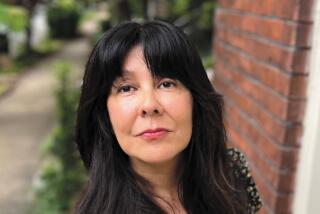Book review: ‘Akata Witch’ by Nnedi Okorafor
Akata Witch
A Novel
Nnedi Okorafor
Viking: 352 pp., $17.99, ages 12 and older
The protagonist at the center of the young-adult novel “Akata Witch” lives in many worlds. She is, in the truest sense, African American: Nigerian by ancestry, American by birth. Born in New York, she moved to West Africa with her parents and brothers when she was 9.
But Sunny Nwazue is also albino, with skin the color of “sour milk” and “hazel eyes that look like God ran out of the right color.” Complicating matters further, she’s a witch.
It’s these intriguing and frequently at-odds attributes that drive the action in the latest novel from Chicago-area author Nnedi Okorafor, a Nebula Award nominee who was born in the U.S. to Nigerian immigrant parents and has spent much time in the West African country. In an increasingly globalized world, Okorafor’s outsider perspective offers a refreshing Afro take on the popular coming-of-age fantasy genre.
Sunny does not know she has mystical abilities when she first moves to Nigeria. Like a lot of tween girls her age, she just knows she feels awkward and out of place. She is routinely taunted not only for her ghostly skin color but for her origins. She’s an “Akata,” her schoolmates tease, using a pejorative West African term for foreign-born blacks.
“Akata Witch” is told in the third person, but the focus is clearly on Sunny. Her parents are overly protective, especially her father, who embodies the African patriarchy in his lax oversight of Sunny’s brothers while insisting on a curfew for his daughter. Granted, Sunny is just 12. There’s also a serial killer on the loose who has been targeting local children.
Outcasts tend to find their way toward others who also don’t fit in, and Sunny is no exception. She befriends a boy named Orlu who came to her defense after a particularly unpleasant altercation with a classmate. Through Orlu, she then befriends Chichi, a mischief maker of a girl who senses Sunny may be a “leopard person.”
Leopard people are gifted with mystical abilities, or magic. They value learning and prize individualism, unlike “lamb” people who care only about money and material goods.
Most leopard people come from magical families, including Chichi, Orlu and another boy Sunny befriends named Sasha, whose parents sent him to Nigeria from New York as punishment for inappropriate use of his “juju” powers. Sunny, however, is a rare “free agent” — “a random of nature, a result of mixed-up and confused spiritual genetics.” Her mother is a devout Catholic who doesn’t seem to appreciate magic.
Tapping in to her powers is mostly a matter of learning and practice, which Sunny does with the help of her new friends, a mentor and a book called “Fast Facts for Free Agents.” Pages of this juju primer serve as the lead-ins to chapters of the book, as do Nigerian symbols for words like “welcome” and “nighttime,” foreshadowing events to come.
After the friendships have been established, “Akata Witch” becomes something of a quest story, with plot similarities to James Patterson’s “Witch & Wizard” series and other fantasies, as the kids hone their individual magical abilities in a bid to thwart evil. Bound together as a coven, the quartet of young sorcerers have been brought together, it turns out, to stop their town’s serial killer.
The book is similar in theme to many other coming-of-age fantasies, but the details are distinctly African, the language unrushed and elegant. The dresses the girls wear are crafted from traditional raffia ribbon. The sounds of Fela Kuti and other Afrobeat musicians are often playing in the background of the action.
“Akata Witch” is a much-needed addition to the many titles featuring Caucasian protagonists — one that will appeal to readers who are interested in foreign cultures, tradition and beliefs, or those who live between cultures themselves.
More to Read
The biggest entertainment stories
Get our big stories about Hollywood, film, television, music, arts, culture and more right in your inbox as soon as they publish.
You may occasionally receive promotional content from the Los Angeles Times.






